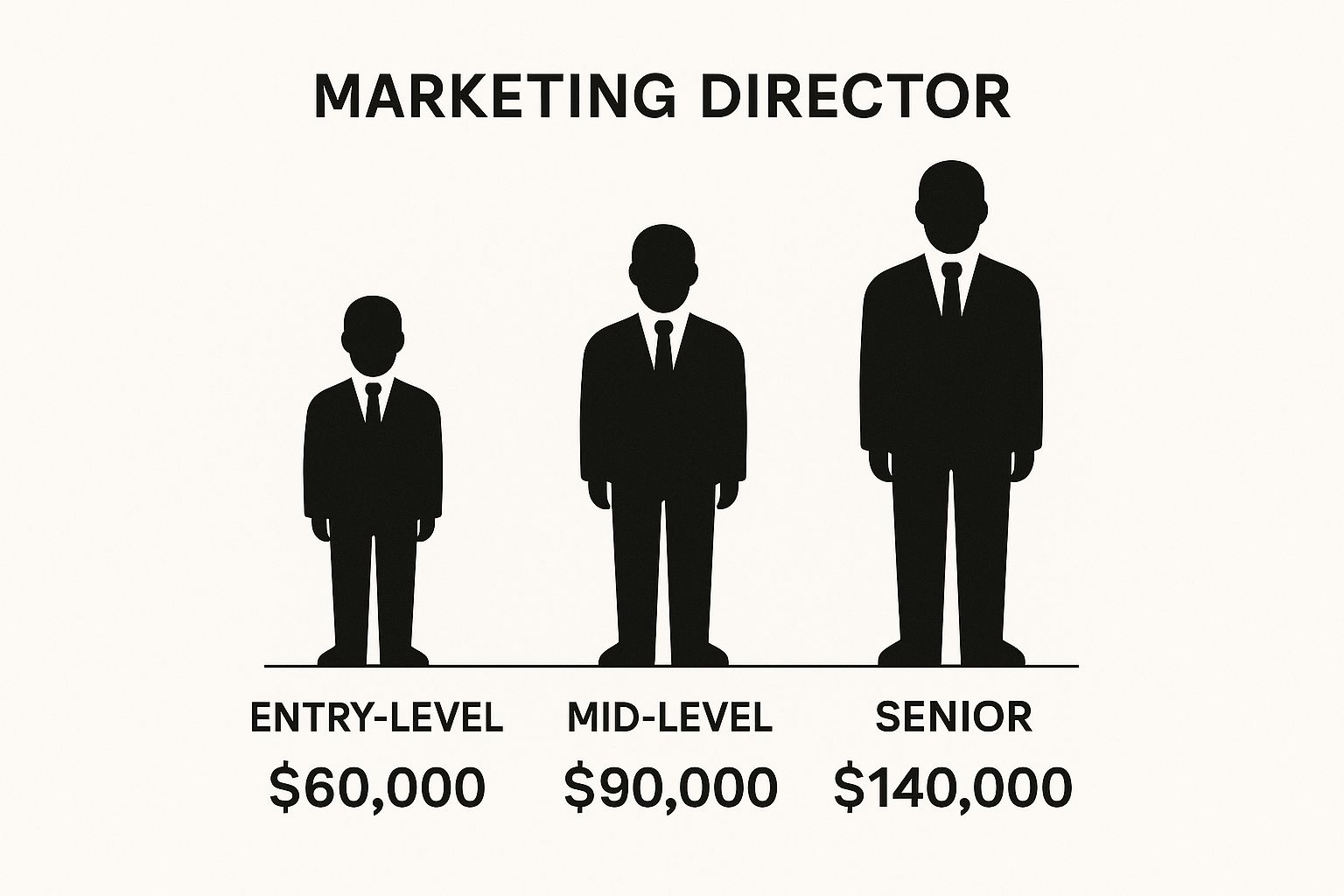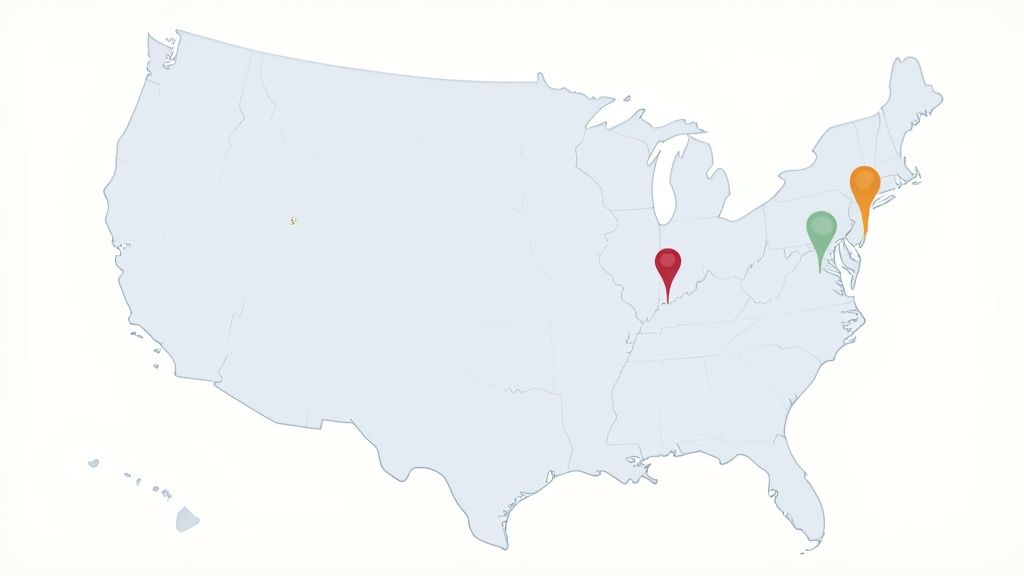
How Much Do Marketing Directors Make in 2024?
Published
Let's get straight to the point: what kind of salary can a marketing director expect to earn? The short answer is, it's a handsome figure, typically landing somewhere between $150,000 and over $250,000 a year.
That's a pretty wide gap, and for good reason. A marketing director's compensation isn't just one number; it's a reflection of their experience, the industry they're in, and where they're located. This role is crucial to a company's success, and the pay reflects that responsibility.
Breaking Down the Marketing Director Salary
Think of a marketing director's salary less as a fixed point and more as a spectrum. At one end, you might have a director leading the charge at a smaller, local business. At the other, you've got a seasoned executive steering the ship for a global tech or finance giant in a major city. The national average gives us a good baseline, but the really interesting part is understanding what pushes that number higher or lower.
For example, a Global Marketing Director role naturally comes with a bigger paycheck because the scope and complexity are on a whole other level. As of early 2025, the average salary for a Global Marketing Director in the U.S. is sitting at around $240,287. Most professionals in this role see their earnings fall between $214,983 and $270,393. These numbers really underscore the earning potential for those who climb to the top of the marketing ladder. You can dig into more salary data for global marketing directors to see how those figures are broken down.
To give you a clearer snapshot of what to expect, let's lay out some of the key benchmarks.
Marketing Director Salary At a Glance
This table offers a quick summary of the typical salary ranges for Marketing Directors across the U.S., covering the average, median, and top-tier earnings you're likely to see.
| Metric | Salary Range | Notes |
|---|---|---|
| Median Base Salary | $165,000 - $185,000 | This is the middle of the pack—half of all marketing directors earn more, and half earn less. |
| Average Total Compensation | $180,000 - $220,000+ | This figure includes the base salary plus common perks like annual bonuses and profit sharing. |
| Top 10% Earners | $250,000+ | This tier is typically reserved for directors with deep experience, specialized skills, or those working in high-paying industries. |
This table shows that while the base salary is strong, total compensation tells a more complete story, especially for high-performers.
The real difference between a median salary and a top-tier one? It's almost always built on a foundation of proven ROI, strategic leadership, and a track record of driving measurable business growth.
At the end of the day, these numbers are just a starting point. In the sections ahead, we'll dive into the specific factors—from the industry you choose to how well you negotiate—that will ultimately decide where you land on this lucrative pay scale. Knowing what these variables are is the first step toward maximizing your own earning potential.
What Really Shapes a Marketing Director's Paycheck?
The national average for a marketing director's salary is a great starting point, but it's just that—a start. Think of it as a base number. From there, several key variables come into play, acting like dials that can turn your potential earnings way up or down.
What you actually take home is a unique mix of your professional background, the industry you're in, and the kind of company you work for. These aren't just minor details; they can create huge swings in compensation. Let's dig into the three biggest factors.
Your Years in the Game
Experience is, without a doubt, one of the heaviest hitters when it comes to your salary. A director who just stepped into the role with five years of marketing under their belt is playing in a completely different ballpark than a seasoned pro with over 15 years of proven wins.
It makes sense, right? More time in the field usually means you have a solid track record of driving real revenue, leading bigger teams, and successfully navigating tricky market shifts.
- Entry-Level Director (5-8 years of experience): You'll likely start at the lower end of the pay scale. At this stage, you're building your reputation as a strategic leader.
- Mid-Career Director (8-15 years of experience): With a history of consistent results and experience managing hefty budgets, you can command a much higher salary.
- Senior/Executive Director (15+ years of experience): This is the top tier. You bring deep industry knowledge, a powerful professional network, and a history of creating game-changing growth.
This visual shows just how clearly salary climbs with experience.

As you can see, the jump from an early-career director to a senior leader can literally double your base pay. That's a testament to the immense value companies place on seasoned expertise.
The Industry You Call Home
Not all industries see marketing through the same lens, and that difference shows up directly in the paycheck. Sectors where customer acquisition is expensive, the products are complex, or the revenue streams are massive tend to pay their marketing leaders a premium.
A marketing director in the tech or SaaS world, for example, will almost always out-earn someone in the non-profit sector. In tech, marketing isn't just a support function; it's a primary engine for growth that's directly tied to getting users and making money. You'll see similar high-end salaries in finance, pharmaceuticals, and professional services, where the stakes are incredibly high. For a closer look at how specialization impacts pay, you can explore the differences in our guide to the director of digital marketing salary.
The Scale of the Company
Finally, company size is a huge piece of the puzzle. A director at a Fortune 500 company is steering a massive ship—we're talking multimillion-dollar budgets, global campaigns, and large, complex teams. Their compensation has to reflect that enormous scope and responsibility.
In contrast, a director at a startup or a small business has to be a jack-of-all-trades. While their impact on the business is direct and powerful, the available resources and total revenue are smaller, which usually means a lower base salary. The trade-off? Startups often offer equity, which can turn into a massive financial win if the company takes off.
When it comes to a marketing director's salary, one of the oldest rules in the book still applies: it's all about location, location, location. Where you decide to build your career can easily create a pay gap of tens of thousands of dollars for the very same job title.
This isn't random. It’s a direct reflection of local economies. Major business hubs like San Francisco, New York City, and Boston are packed with corporate headquarters and deep-pocketed tech firms. This concentration of opportunity creates a fierce battle for top-tier marketing talent, which naturally pushes salaries sky-high.

Why Big Cities Pay More
It really boils down to simple supply and demand. In a city loaded with Fortune 500s and ambitious startups, the need for savvy marketing leaders often outpaces the number of qualified candidates available. To get the best, companies know they have to pay a premium.
But let’s be real—that bigger paycheck is also a necessity. The cost of living in these prime locations is dramatically higher than in most other parts of the country. A $200,000 salary in San Jose, California, can feel a lot like a $140,000 salary in a smaller city once you factor in rent, taxes, and everything else.
A higher salary in a major city isn't just a perk; it's a necessary adjustment to a more expensive economic environment. Your real earning power is what’s left after a city’s cost of living takes its share.
Top-Paying Metropolitan Areas
While you can find competitive salaries in many cities, a few metro areas consistently lead the pack for marketing professionals. These are usually places with booming tech, finance, or biotech scenes.
- San Francisco Bay Area, CA: As the heart of Silicon Valley, this region boasts some of the highest salaries in the country. Top-level directors here can easily pull in over $250,000 in base pay alone.
- New York, NY: A global center for finance, media, and advertising, NYC has to offer top dollar to attract the sharpest marketing minds in the world.
- Boston, MA: This city is a hotbed for tech and biotech, creating a competitive job market that keeps salaries for marketing directors very strong.
- Seattle, WA: Home to giants like Amazon and Microsoft, Seattle remains a high-paying city for seasoned marketers.
- Los Angeles, CA: The entertainment and media industries fuel a dynamic and well-paid market for creative marketing leaders.
Interestingly, while big cities dominate the top spots, the pay scale across the country can sometimes be less varied than you’d think. For example, the average hourly wage for a Global Marketing Director is around $97.36, which translates to an annual salary of about $202,500. A director in Connecticut, however, earns an average of $203,648—almost identical to the national figure. This just goes to show that high salaries aren't only found in the biggest metro areas. You can always explore more data on how salaries vary by state to dig deeper.
Don't Just Look at the Base Salary
When you ask, "How much do marketing directors make?" it's natural to think of that one big number: the annual salary. But fixating only on that figure is like judging a gourmet meal by the appetizer alone—you're missing the best parts. A marketing director's total compensation package tells a much richer story.
Think of your base salary as the starting point. It's the guaranteed foundation. From there, companies layer on incentives that can dramatically increase your take-home pay, often boosting your total earnings by 20% to 50%. In a great year, it could be even more.
The Impact of Performance-Based Pay
A huge chunk of that extra income often comes from variable pay, which is tied directly to results. This isn't just handed to you; you earn it by hitting specific goals. It's the company's way of rewarding you for moving the needle.
This performance pay usually shows up in a few different ways:
- Annual Bonuses: This is the classic lump-sum payout you get once a year. It's typically a cocktail mixed from your personal performance, your team's achievements, and how well the entire company did financially.
- Targeted Incentives: These are more specific than the annual bonus. You might get a payout for crushing a lead generation goal, lowering the customer acquisition cost (CAC) below a certain threshold, or directly driving a major jump in revenue.
- Profit-Sharing: Some companies set aside a percentage of their profits to share with employees. As a director, you're in line for a significant piece of that pie, directly connecting your strategic work to the company's financial health.
Your base salary is what you get for doing the job. Your bonus is what you get for crushing it. This is how the highest-earning directors pull away from the pack.
Building Real Wealth with Equity
Equity is where things get really interesting, especially if you're working at a startup, a tech company, or a publicly-traded corporation. This is your slice of ownership, your piece of the company. It aligns your personal financial success with the company's growth, making it the ultimate long-term reward.
It’s typically offered in two main forms:
- Stock Options: This gives you the right to buy company shares at a locked-in price (the "strike price") down the road. If the company takes off and the stock's market value soars past your strike price, you can cash in on the difference for a potentially massive payday.
- Restricted Stock Units (RSUs): Think of these as a promise of future shares. You're granted a certain number of shares that become fully yours after you've stuck around for a while, according to a "vesting schedule." Unlike options, RSUs hold value as long as the stock is worth something.
Getting a handle on these components is critical. An offer with a $180,000 base salary, a 25% bonus target, and a solid equity grant could easily be worth more than a straightforward $210,000 salary with no extras. When you're looking at a job offer, thinking beyond the base pay isn't just a good idea—it's how you build real wealth.
Charting Your Path to a Top-Tier Salary

Becoming a high-earning marketing director isn't just about getting a lucky break or a single promotion. It’s a deliberate climb, with each step forward built on a solid foundation of new skills and, most importantly, measurable results. Think of it as a marathon, not a sprint.
Most people start out in roles like Marketing Coordinator or Digital Marketing Specialist. This is where you get your hands dirty, learning the tools of the trade, executing campaigns, and really understanding the mechanics of how marketing works from the ground up. The next logical step is often to Marketing Manager, where the focus starts to shift from doing the work to managing the work and the people behind it.
From Manager to Strategic Leader
The real game-changer is the leap from manager to director. This is where your perspective has to completely shift—you're no longer just managing campaigns, you're managing the business of marketing. Your value isn't measured by the tasks you check off a list, but by the strategic vision you bring to the table and the revenue you help generate.
If you want to justify a top-tier salary, you have to prove you're a master of these key areas:
- P&L Management: Can you own a budget, forecast accurately, and clearly demonstrate a positive return on investment? You have to be able to speak the CFO's language.
- Team Leadership: This is so much more than just managing direct reports. It's about mentoring rising stars, fostering a high-performance culture, and making sure your team is completely aligned with the company's biggest goals.
- Strategic Planning: You need the ability to craft a long-term marketing vision that not only supports the business but also pinpoints new market opportunities and keeps you one step ahead of the competition.
The moment a marketing director's salary potential skyrockets is when they can draw a straight line from their team's activities to the company's bottom line. It’s all about changing the conversation from campaign clicks to revenue growth.
Building Expertise for Higher Pay
As you move up the ladder, developing a specialty can give your earning potential a serious boost. To really command a higher salary and set yourself on a path to the top, look into high-demand areas where unique skills are prized, like Web3 marketing expertise. Having that kind of forward-looking knowledge makes you an indispensable asset.
Keep in mind, this progression doesn't happen overnight. Recent data shows the average salary for a Global Director of Marketing is about $160,000 per year, and 56% of people in this role are between 36 and 41 years old. This really drives home that it's a mid-career position that demands a significant amount of real-world experience.
Ultimately, every role you take is a building block. Mastering the skills at each level prepares you for the next, which in turn comes with greater responsibility and a bigger paycheck. Following a well-thought-out https://influencermarketingjobs.net/blog/digital-marketing-career-path is the most reliable way to get where you want to go.
Getting Paid What You're Worth: How to Negotiate Your Salary
Talking about money can feel awkward, but it shouldn't. Think of it less as a confrontation and more as a critical business conversation. The goal is to frame the discussion around what your proven expertise is worth, not just what you want.
A successful negotiation is won or lost before you even step into the room. It all comes down to preparation.
Do Your Homework: Build a Data-Backed Case
You wouldn't launch a marketing campaign without data, right? The same logic applies to your salary. Walking in unprepared is like flying blind. Before you talk numbers, you need to arm yourself with cold, hard facts.
Jump onto reputable salary websites and research how much marketing directors make in your city, your specific industry, and at companies of a similar size. This homework gives you a realistic, evidence-based range. It shows the hiring manager you're serious and that your request is grounded in market reality, not just wishful thinking.
When you back up your ask with solid research, the conversation shifts. It's no longer a personal request; it's a professional discussion about aligning your pay with your market value.
Prove Your ROI: Talk in Numbers
Once you know the market rate, you have to show them why you're worth the top end of that range. This is where you connect your past performance to their future success. Don't just list your old job duties; highlight your wins with concrete metrics.
Did you boost lead generation by 30%? Slash customer acquisition costs by 15%? Drive a product launch that pulled in $2 million in new business? Quantifying your achievements like this makes your value undeniable. It gives the company a clear picture of the return they can expect on their investment—you.
If you really want to sharpen your skills, diving into more advanced contract negotiation strategies can give you a serious advantage.
Common Questions Answered
If you're mapping out your career as a marketing director, you probably have a few questions about what comes next and how to maximize your earnings. Let's get right into some of the most common ones.
What's the Next Rung on the Ladder After Marketing Director?
Once you've hit the director level, the path usually leads toward the executive suite. The most natural next step is often a Vice President (VP) of Marketing role. This is where your responsibilities expand from leading a department to shaping the broader marketing strategy for the entire company.
From there, the ultimate goal for many is becoming the Chief Marketing Officer (CMO). As a C-suite executive, a CMO is responsible for the organization's entire brand and growth engine. Some marketing leaders even pivot into general management, taking on roles like Chief Operating Officer (COO) or even CEO.
How Much Can a Marketing Director at a Startup Expect to Make?
Startup salaries are a different beast altogether. The base pay might seem a bit lower, typically falling somewhere between $120,000 and $180,000, but the real story is in the compensation package.
A huge part of the appeal is the equity stake. It’s a classic high-risk, high-reward situation. Your actual take-home cash will also depend heavily on the startup's funding stage—a Series C company in a major tech hub will offer a much more competitive salary than an early-stage seed-funded one.
Which Skills Will Really Boost a Marketing Director's Salary?
To really push your earning potential, you need a powerful mix of strategic vision, technical know-how, and solid leadership. Certain skills are in particularly high demand and can give you a serious edge.
- Digital Marketing Analytics: You have to be able to prove your impact. Deep expertise in data analysis is non-negotiable for top earners.
- Marketing Automation: Getting your hands dirty with platforms like HubSpot or Marketo shows you know how to build and scale a modern marketing machine.
- Financial Acumen: Nothing screams "executive potential" like being able to confidently manage a P&L and forecast a budget.
At the end of the day, the single biggest factor in salary negotiations is a proven track record of leadership that directly ties your efforts to revenue growth.
Ready to make your next career move? Influencer Marketing Jobs is where you'll find the best opportunities in the industry. Find your next role today.